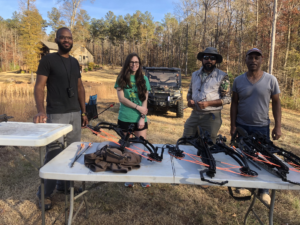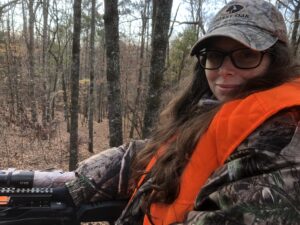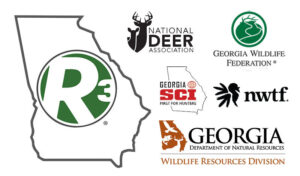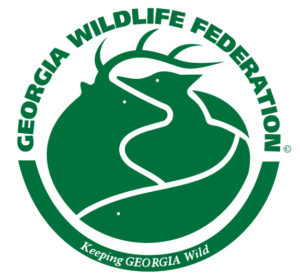By Bre Bashford, Georgia R3 Coordinator
Forsyth, GA-Tasha Bishop speaks to a Food to Fork coach Justin Mizell brainstorming ways to improve her accuracy with her crossbow. It’s the Friday of a weekend learn to hunt event with five other pairs of students and volunteer coaches. All of whom are preparing for their individual deer hunts the following two days.
Learning how to hunt takes a lot of courage; that amount of courage is amplified when one is an adult learner challenging years of familiarity of shopping for meat at the grocery store. In other words, taking the life of an animal is no easy task and shouldn’t be taken lightly. Many don’t know if they will be able to pull a trigger if the opportunity arises. This internal dialog requires intentional consideration. The number of individuals interested in trying the hunting lifestyle, with no one they know to teach them is greater than learn to hunt programs can support.

Students Antonio, Tasha, Nur and Ellis practice using their crossbows.
Through coordination of the GA R3 Initiative organizations, including the National Deer Association, Field to Fork took its’ foothold in Georgia in 2017 with the mission of introducing food motivated adults from non-traditional backgrounds to an organic free-range protein source. Over the course of multi-day training events, students master use of a crossbow, review deer biology, discuss hunting strategy, hunt with one-on-one guidance and try various types of game meat. The program primarily relies on volunteer efforts including the donation of lodging, game meat, coordination of experienced coaches and hunting land. Although primary motivations for participation may circle around food, other reasons are apparent.
Tasha, a solo mom of two teenage sons wanted to learn to hunt because her boys expressed interest in the activity. The boys don’t have a male figure in their life to teach them these types of things. She shared her story to inspire other women to learn and other men to teach.
“Their dad passed away five years ago at a time when the boys needed him most, when I needed him. I can’t even begin to explain how defeated and heartbroken one feels when they can’t give their children what they need… teach them what they want to learn. As a solo mom, I had no one to help. I asked men I knew, but none were willing to take my boys out or teach them.”
She searched for programs on the Georgia Department of Natural Resources-Wildlife Resources Division website for her boys, but couldn’t find any availability for them. Realizing she would need to do the teaching; she selected the Field to Fork Program for herself. She was nervous about being around new people and being away from home overnight on her own, but found that “the fellow hunters and the mentors were amazingly kind and helpful.” She expressed appreciation for the comradery, connections and memories made. Tasha took a leap of faith and was quickly rewarded by how interested her boys were in her activities.
“When I’d call them throughout the weekend to check on them, they’d have tons of questions. They seemed to be surprised and proud that I did it. I know they have a hard time seeing me as someone they can learn “manly” things from. Hunting is one of those areas that is predominantly male.”

Tasha, mom of two teenage boys, implements her newfound skills in a tree stand
According to Southwick’s Associates and the National Shooting Sports Foundation 87% of US hunters are male. Females on the other hand, are the quickest growing segment of new participants. Since 2011 the number of women hunters in the US has increased 24%. Woman focused learn to hunt programs such as Becoming an Outdoor Woman and Artemis Georgia are driving this growth locally.
Only four days after Tasha’s participation in Field to Fork she took her 15-year-old to a public Wildlife Management Area.
“We had a great time. We walked down a horse trail in the dark and then off into the woods a good ways. I had picked us a spot the day before so it was somewhat ready. We sat side by side against a tree. We didn’t see anything while sitting. We did see a doe as we were walking out though and that was a great moment to share with him.”
Tasha intends to keep at it. She enjoys the quality time and connection it gives her to her boys. They talk about hunting and now seem to view her as someone they could learn from. Personally, she’s grateful for a new opportunity to get outdoors and likes the idea of eating meat from a source she knows she had a hand in.
Hunting isn’t for everyone, but for those who have interest in understanding more or want to give it a try, follow the organizations of the Georgia R3 Initiative for learn to hunt programs and resources: which includes Georgia Wildlife Federation, Georgia Department of Natural Resources Wildlife Resources Division, National Wild Turkey Federation, National Deer Association, and Georgia Chapter of Safari Club International.
With questions or if you have interest in coordinating a Field to Fork event in your community contact Bre@gwf.org.


Recent Comments